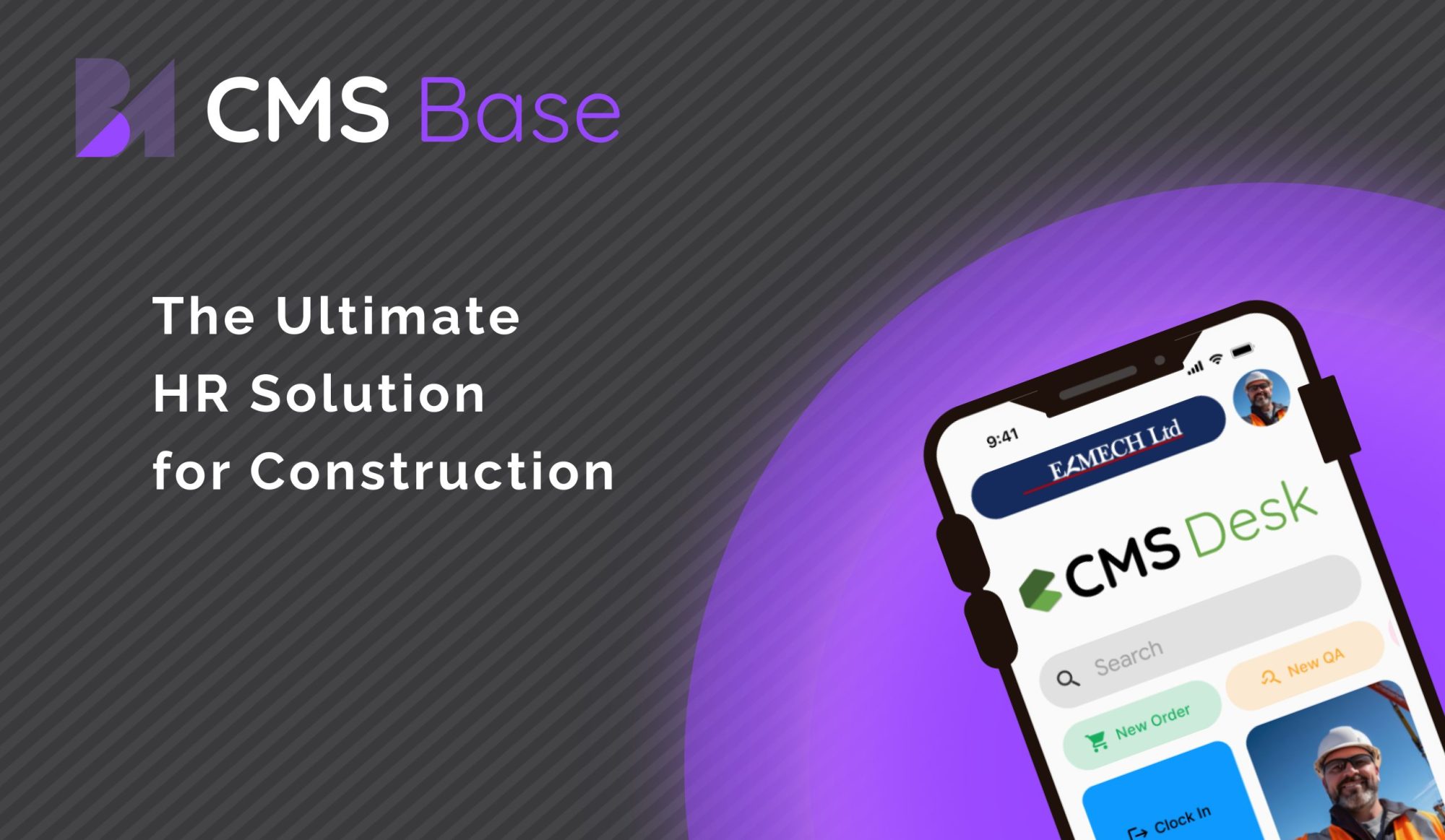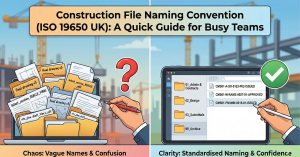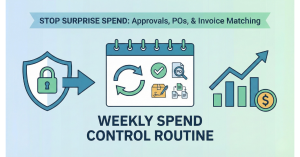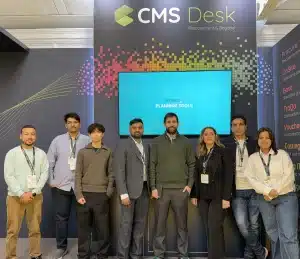In the construction industry, where operations are labor-intensive and project-driven, the Human Resources (HR) function plays a pivotal role. From recruitment to compliance and workforce development, HR in the construction company ensures that projects are delivered efficiently, legally, and safely. Digitising these HR processes can significantly simplify operations across job sites — and platforms like CMS Desk offer one of the best solutions for managing it all in one place.
This blog explores the key responsibilities, policies, and tools that define construction human resources, highlighting their growing importance in today’s competitive industry.
What Does HR Mean in the Construction World?
In simple terms, HR in construction stands for Human Resources, which is responsible for managing people across multiple job sites. Unlike static office environments, construction projects require a highly flexible and agile workforce strategy. Depending on the project and region, HR must handle rotating teams, subcontractors, seasonal labor, and varying compliance requirements.
The HR meaning in construction extends beyond traditional administration; it encompasses labor coordination, compliance enforcement, health and safety, and conflict resolution, all while navigating a dynamic, high-risk work environment.
Building Better Workplaces: HR Policies in Construction Companies
In an industry as dynamic and high-risk as construction, HR policies aren’t just procedural; They’re essential for ensuring safety, legal compliance, and workforce harmony. Given the transient nature of construction roles and the physical intensity of the work, HR policies in construction companies must be comprehensive, adaptable, and rigorously enforced.
Key policy areas typically include:
Site-Specific Health and Safety Regulations
Construction sites come with varying hazards depending on location, equipment, and project type. HR policies must outline clear safety procedures tailored to each site, including PPE (Personal Protective Equipment) guidelines, emergency response plans, and safety training requirements.
Equal Opportunity and Anti-Discrimination Policies
With construction teams often comprising a diverse mix of backgrounds and skill levels, enforcing inclusive policies is vital. These policies foster a respectful, equitable environment and help prevent issues of bias, harassment, or unfair treatment.
Leave Management and Wage Compliance
Managing leave entitlements, overtime, and shift differentials can be complicated when dealing with rotating crews or subcontractors. Transparent wage policies and streamlined leave management systems help prevent misunderstandings and ensure fair compensation.
Disciplinary Actions and Grievance Redressal
Construction sites can be stressful environments, and conflict or misconduct can arise. Clear, well-documented disciplinary and grievance procedures enable HR to resolve issues quickly and fairly, maintaining productivity and morale.
Substance Abuse and Conduct Regulations
Safety-sensitive work demands strict substance control policies. HR must enforce guidelines around substance use and set expectations for professional behavior on-site to reduce risk and maintain a safe workplace.
Implementing these policies effectively requires tools that can standardise procedures across multiple job sites. Platforms like CMS Base offer features that assist HR teams in maintaining consistency and compliance throughout the organisation.
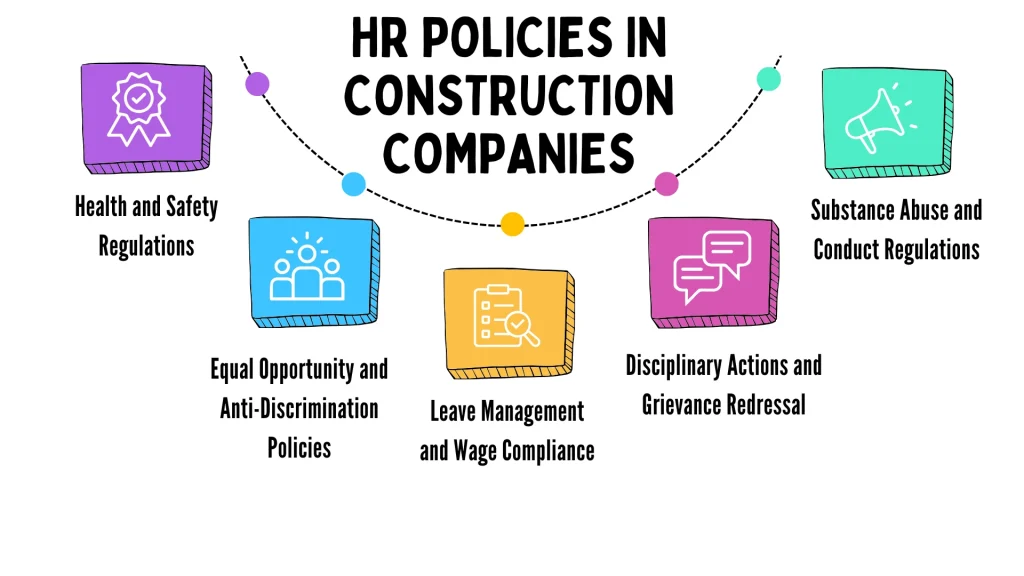
Behind the Build: Key HR Responsibilities and Functions
The HR responsibilities in construction company settings are diverse and extend far beyond basic administration. Similarly, the HR functions in construction company operations are both strategic and operational. Together, they include:
- Recruitment and Onboarding: Hiring skilled workers and ensuring they meet the project’s requirements.
- Training and Development: Delivering safety training, technical skills enhancement, and compliance courses.
- Payroll and Benefits Administration: Handling accurate and timely compensation for varying worker types.
- Labor Law Compliance: Managing employee records and ensuring legal conformity in employment practices.
- Conflict Resolution: Addressing site-related grievances and promoting a positive work culture.
HR must be proactive, adaptive, and often act as a liaison between management, workers, and unions.
Strategic Workforce Planning: Human Resource Management in Construction
Human resource management in construction companies requires a strategic approach to workforce planning. This includes anticipating project-based hiring needs, aligning workforce skills with future demands, and promoting employee retention in an industry known for high turnover.
Moreover, HR contributes to productivity by reducing absenteeism, improving employee engagement, and aligning workforce goals with business objectives.
HR Jobs in Construction Companies: Who Keeps the Projects Moving?
There’s a rising demand for HR professionals who understand the operational complexity of the construction field. Common HR jobs in construction companies include:
- HR Generalists or Business Partners
- Health and Safety Officers
- Talent Acquisition Specialists
- Training Coordinators
- Payroll and HRIS (Human Resource Information System) Administrators
These roles are essential for managing both white-collar staff and blue-collar laborers, ensuring smooth operations across departments and job sites.
Hard Hats & Hiring Gaps: Common HR Challenges in the Construction Industry
Despite its critical importance, human resources in construction face a unique set of challenges that differ from traditional industries. The dynamic, decentralised nature of construction projects, paired with tight deadlines and safety pressures, makes HR management especially complex.
Here are some of the most common challenges construction HR teams encounter:
High Turnover & Labor Shortages
Construction companies often grapple with a transient workforce. Seasonal hiring, project-based contracts, and the physical demands of the job result in high attrition rates. Recruiting and retaining skilled laborers becomes a continual challenge, putting projects at risk of delays and cost overruns.
Decentralised Workforce Management
With workers spread across multiple sites, cities, or even countries, maintaining consistent communication and applying standardised HR policies becomes difficult. This fragmentation leads to inconsistencies in training, compliance, and performance tracking.
Safety Compliance & Training
Safety is non-negotiable in construction, yet ensuring that every worker receives up-to-date training is a logistical challenge. Managing certifications, conducting regular audits, and embedding safety culture into daily routines require a robust system and proactive HR intervention.
Wage & Labor Law Compliance
Different regions have different legal frameworks for construction labor. HR must ensure compliance with wage laws, working hours, leave policies, and employment documentation, especially when dealing with subcontractors or temporary staff. Errors can result in legal penalties or reputational harm.
Cultural & Language Barriers
Construction sites often include diverse crews, where language differences and cultural nuances can cause communication breakdowns or misunderstandings. HR plays a vital role in bridging these gaps through inclusive onboarding, sensitivity training, and multilingual communication materials.
Limited Digital Adoption
Many construction companies still rely on outdated HR processes like manual timesheets or paper-based personnel files. This not only slows down operations but also increases the chances of errors. However, companies using tools like CMS Base are beginning to close this gap, digitising employee records, automating payroll, streamlining workforce scheduling across job sites — all while leveraging the benefits of workforce management software for construction.
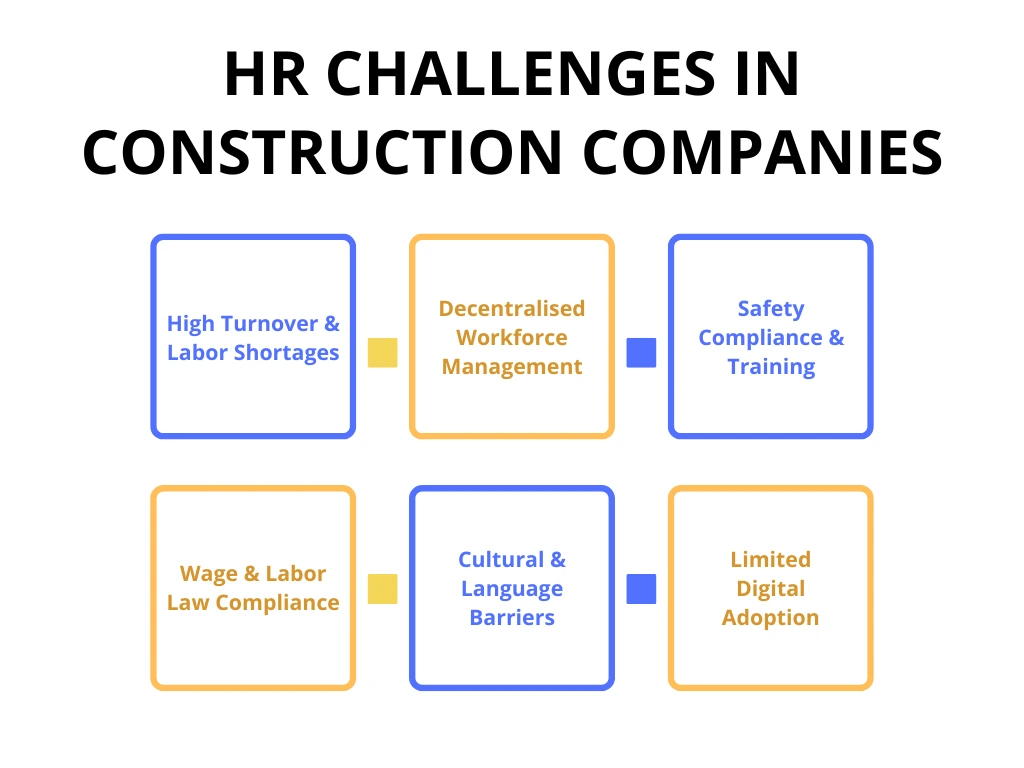
Digital Workforce Management: HR Software for Construction Companies
To improve efficiency, many firms are adopting HR software for construction companies as part of their broader strategy to choose the best construction management software for their needs. These tools help manage the workforce through:
- Mobile-enabled time tracking and attendance
- Certification and compliance documentation
- Workforce scheduling and labor forecasting
- Payroll processing and benefits administration
- Onboarding and training automation
Solutions like CMS Base offer a suite of tools designed to streamline HR processes, manage employee data, and optimise workforce performance. By automating routine tasks and providing valuable insights, such platforms empower HR teams to focus on strategic initiatives and contribute to a high-performing and engaged workforce.
Why Human Resources Matter More Than Ever in Construction
Human resources for construction companies are fundamental for:
- Managing complex and often temporary workforce structures
- Ensuring compliance with constantly evolving health and safety standards
- Reducing costly delays due to labor shortages or mismanagement
- Creating a sustainable workplace culture to retain talent
Without robust human resource management in construction, even the most well-funded construction project can face costly delays, legal challenges, or reputational damage.
Conclusion: HR as the Backbone of Construction Success
As the industry becomes more digitised and compliance-driven, the importance of HR in construction is only increasing. Whether it’s through effective human resource management in construction companies, implementing smart HR software, or creating strong workplace policies, HR is not just a support function, it’s a critical success factor.
By strengthening construction human resources, companies can build not only resilient structures but also resilient teams that drive long-term success.
Frequently Asked Questions
1. How is HR in construction different from HR in other industries?
Unlike traditional corporate settings, HR in construction must manage site-based, mobile, and often short-term workforces. This includes coordinating shift workers, subcontractors, and seasonal laborers, all while maintaining safety and legal standards across varying environments.
2. How can construction companies improve employee retention through HR?
Retention in construction can be improved by offering continuous training, recognising achievements on-site, providing clear career paths, and fostering a culture of safety and inclusion.
3. What are the legal risks if HR processes are not properly managed in construction?
Improper HR practices can lead to non-compliance with labor laws, penalties for health and safety violations, disputes over wage payments, and even lawsuits related to discrimination or unfair dismissal. Having formal policies and digital HR systems in place can help mitigate these risks.
4. How does HR support diversity and inclusion in a traditionally male-dominated industry?
HR can lead initiatives to create inclusive job descriptions, run anti-bias training, implement zero-tolerance policies for discrimination, and promote women and underrepresented groups in trade roles. Creating visible pathways for advancement is key to long-term inclusivity.
5. How does technology enhance HR performance in construction?
Tech tools like CMS Base help HR teams centralise records, automate onboarding, track certifications, and schedule safety training, streamlining what would otherwise be time-consuming manual tasks. This allows HR to focus more on strategic planning and employee experience.
6. Can HR play a role in improving productivity on job sites?
Yes. HR can help align manpower planning with project timelines, reduce absenteeism, and build team cohesion through effective communication strategies. Incentive programs, wellness initiatives, and conflict resolution mechanisms also help maintain high morale and consistent output.
7. What metrics should HR track in a construction company?
Key HR metrics include turnover rate, time-to-hire, training completion rates, safety incident frequency, absenteeism, and compliance audit scores. These insights can inform hiring strategies, safety improvements, and workforce planning decisions.
Any questions? Get in Touch
